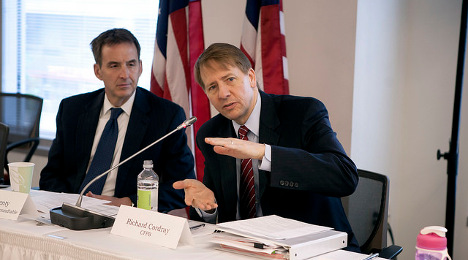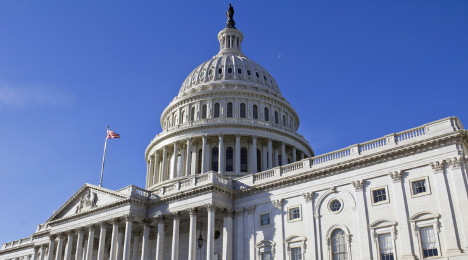The Consumer Financial Protection Bureau released its monthly consumer complaints snapshot report on Tuesday, drilling down into a pair of topics. Those spotlight subjects included credit reporting and the city of Los Angeles.
As of Aug. 1, the CFPB reported that it has handled 677,200 complaints nationally. Some of the findings from the statistics being published in this month’s snapshot report include:
• Complaint volume: For July, bureau officials indicated the most-complained-about financial product or service was debt collection, representing about 31 percent of complaints submitted. Of the 26,704 complaints handled in July, approximately 8,224 of them were about debt collection.
The second most-complained-about consumer product was credit reporting, accounting for approximately 6,696 complaints. The third most-complained-about financial product or service was mortgages, accounting for approximately 4,498 complaints.
Auto loans weren’t listed among the 11 specific credit products trigging complaints, according to the CFPB’s report.
• Product trends: In a year-to-year comparison, the CFPB noted consumer loan complaints, which include pawn loans, title loans, and installment loans, showed the greatest percentage increase — 61 percent — from the same time last year. They went from approximately 718 complaints to 1,154 complaints on average per month over a three-month time period.
The bureau added that bank account or services complaints showed the greatest percentage decrease over the same time period, going from a monthly average of 1,976 complaints in 2014 to 1,895 complaints in 2015, a 4 percent decrease.
• State information: Officials pointed out Hawaii, Maine, Georgia, and North Carolina experienced the greatest complaint volume increases from the same time last year; with Hawaii up 37 percent, Maine up 36 percent, and both Georgia and North Carolina up by 33 percent.
The CFPB also mentioned South Dakota, New Mexico, and Alaska experienced the greatest complaint volume decrease from the same time last year, with South Dakota down 31 percent, New Mexico down 16 percent, and Arkansas down 11 percent.
• Most-complained-about companies: Bureau officials went on to report that the top three companies that received the most complaints from March through May of this year were Equifax, Experian, and Bank of America. The CFPB added that of the five most-complained-about companies, three of them — Equifax, Experian, and TransUnion — are credit reporting companies.
The CFPB explained that company-level complaint data in the report uses a three-month rolling average of complaints sent by the bureau to companies for response. This data lags other complaint data in this report by two months to reflect the 60 days companies have to respond to complaints, confirming a commercial relationship with the consumer.
“Whether a consumer is trying to get a mortgage, apply for a student loan, or buy a car, credit reports are fundamentally important in allowing people to access their financial goals,” CFPB director Richard Cordray said. “As we see a rise in the number of consumers complaining about this issue, the bureau will continue to work to ensure that credit reports are fair, accurate, and readily available to all consumers.”
More details about credit reporting issues
The bureau said it has handled approximately 105,000 credit reporting complaints since it began accepting them in October 2012. Some of the findings in the latest snapshot include:
• Sharp increase in credit reporting complaints: The CFPB saw a 56-percent increase in the number of credit reporting complaints submitted by consumers between June (4,289 complaints) and July (6,969 complaints).
In analyzing the period of May through July, officials noticed complaints increased by 45 percent compared to the prior year.
• Consumers complain about incorrect information on credit reports: The CFPB said the majority of credit reporting complaints — 77 percent to be exact — submitted to the bureau involve incorrect information on reports.
“Consumers frequently complain of debts already paid or debts not yet due showing up on their report, negatively affecting their credit scores,” officials said.
• Consumers complain about trouble accessing reports: The bureau found that consumers consistently report issues related to accessing their credit reports as a result of rigorous online identity authentication questions.
“If unable to access the reports over the Internet, consumers have to send copies of sensitive, identifying documents through the mail, which consumers feel is time-consuming and potentially unsecure,” officials said.
• High-volume complaint companies: Out of all credit reporting complaints submitted to the bureau between March and May, the CFPB determined 97 percent of them involved the three nationwide credit reporting agencies — Equifax, Experian, and TransUnion.
Additional information about Los Angeles
This month, the CFPB highlighted the Los Angeles metro area, the second largest metro area by population in the United States.
As of Aug. 1, the bureau tabulated that consumers in California have submitted 94,000 or 14 percent of the 677,200 complaints the CFPB has handled. Of those complaints, 33,700 of them have come from consumers in the Los Angeles metro area.
Findings from the Los Angeles complaints include:
• Mortgages are the most-complained-about product: Officials noticed mortgage-related complaints have been the most-complained-about product in Los Angeles metro area since the CFPB started taking complaints in July 2011.
While the bureau has received more mortgage complaints nationally than any other financial product, consumers in Los Angeles have submitted mortgage complaints at a higher rate — 35 percent of total complaints — than the national average, which is 28 percent of total complaints.
• Fewer credit reporting and debt collection complaints than national numbers: For consumers in Los Angeles, the bureau mentioned credit reporting complaints — 14 percent versus 16 percent of total complaints — and debt collection complaints — 22 percent versus 25 percent of total complaints — make up a smaller percentage of the complaints they have submitted than consumers nationally.
• Companies that stand out: Without normalization, the bureau indicated credit reporting companies Equifax and Experian were the two most-complained-about companies nationally over a 12-month period.
In the Los Angeles metro area, however, official discovered the most-complained-about companies were Bank of America and Wells Fargo. In the Los Angeles metro area Experian was the third most-complained about company, followed by Equifax (fifth) and TransUnion (sixth).
The entire CFPB monthly complaint report can be found here.
Even the freshest law school graduate likely understands the concept of, “If you didn’t document it, it didn’t happen.”
In an intensifying regulatory world where compliance training is becoming more important, the National Automotive Finance Association highlighted how several major institutions already are leveraging a new education program so finance companies can have a document and more to show an agency investigator.
The NAF Association — a Used Car Week Industry Partner — highlighted how several components of its new Compliance Certificate Program are on a “fast track.” Finance company employees not only can complete the requirements in a timely manner, but the successful completion can give executives another important validation arrow in their compliance quiver if a regulatory investigation unfolds.
The new initiative, hosted by NAF Association with online curriculum segregated from the organization Consumer Credit Compliance Program, can assist finance companies in complying with federal and state regulatory requirements by providing compliance professionals the foundation they need to master federal laws and regulations that dictate consumer credit.
The Compliance Certificate Programs will cover the following roles:
— Collector
— Underwriter
— Sales/Dealer Relations
— Contract Auditing/Funding
— Customer Service
Each training module includes two case studies specific to the subject material of the course and tests the knowledge of the laws and regulations as they apply to real world situations.
Of the major finance companies participating, Westlake Financial Services will have 600 associates enroll in the certificate programs.
“Compliance is a chance for us to differentiate ourselves and gain a competitive advantage," said Ian Anderson, group president of Westlake Financial Services and recipient of the SubPrime Auto Finance Executive of the Year Award last year during the SubPrime Forum at Used Car Week.
“The very best thing we can do in this evolving compliance landscape is to invest in training, and ensure our team has the tools and knowledge to always do the right thing for the customer,” Anderson continued.
After completing the rigorous program, the participants will have gained sufficient knowledge of consumer credit laws and regulations, which will allow them to keep their departments compliant with federal and state standards.
"In today’s compliance environment it is critical to have our managers and support personnel up to date on the laws and best practices that govern the collection department,” said Micky Watts, senior vice president of indirect lending at Anderson Brothers Bank.
“I am excited to see the NAF Association provide the collection compliance certificate course that will allow us to certify our front line personnel and retrain them annually as required by government regulators,” Watts continued.
Currently, the Compliance Certificate Program is only available to employees of NAF Association member companies. But NAF Association executive director Jack Tracey is upbeat about the path companies such as Westlake are forging.
“Westlake’s participation in the program demonstrates the company's determination to ensure better business practices, which will drive better customer service,” Tracey said. “We are excited to see Westlake participate and hope this sparks other finance companies to follow in Westlake's footsteps by registering their employees to get certified.”
NAF Association president Mark Floyd — who came out of retirement in 2010 to spend four years as chief executive officer of Exeter Finance before stepping down last November — also highlighted the traction the organization is getting with this new certificate program.
“With over 645 certificate registrations in the first three weeks of introducing the collector and underwriter certificate modules, we’ve decided to fast track the remaining certificate modules for customer service, funding and dealer sales representatives,” Floyd said. “Now all five certificate programs are available to member companies.
“We’re offering these online certificate modules so that our members can use them to build compliance awareness and knowledge in their front line staff — the people who directly engage with the consumer,”
The National Automotive Finance Association is committed to bringing high quality compliance education to the auto finance industry, not just through this Certificate Program but along with the Consumer Credit Compliance Certification Program and the regional Best Compliance Practices groups.
For more details about any of these programs, visit nafassociation.com or contact Tracey at (410) 865-5431 or [email protected].
Santander Consumer USA Holdings evidently isn’t rattled by the Consumer Financial Protection Bureau turning over allegations to the Department of Justice about how the finance company conducts its business.
SCUSA shared details about the pair of allegations the CFPB made as part its regulatory filing with the Securities and Exchange Commission posted earlier this week. SCUSA said that on July 31 the CFPB notified the finance company that specializes in subprime originations while also being the backbone for Chrysler Capital that the bureau referred certain alleged violations of the Equal Credit Opportunity Act to the Justice Department. The alleged infractions stemmed from:
— Statistical disparities in markups charged by dealers to protected groups on loans originated by those dealers and purchased by SCUSA
— Treatment of certain types of income in the company's underwriting process
The notification about the CFPB moves arrived a day after the company reported its second-quarter performance, which included total originations of more than $7.6 billion.
In its SEC filing, SCUSA said, “The company does not believe that there are any proceedings, threatened or pending, that, if determined adversely, would have a material adverse effect on the consolidated financial position, results of operations, or liquidity of the company.”
Since the CFPB allegations officially hadn’t come to light when SCUSA, investment analysts didn’t probe the company about them. However, when asked about the company’s strategy, new chief executive officer Jason Kulas reiterated much of the same tenor he used when he ascended into his current role at the beginning of July, replacing co-founder Thomas Dundon.
“We are having a lot of discussions about strategy and not just among our management team but also with our board,” Kulas said when the company hosted its second-quarter conference call.
"The level of dialogue we are having is real positive,” he continued, according to a transcript posted by SeekingAlpha.com. “I think one thing that is important to talk about in answering that question is the connection between our former CEO and me and the ongoing dialogue we have been having about this business for over 20 years. Many aspects of the strategy of this business were developed together with Tom and I discussing the business literally every day for a long period of time.
“So for that reason, I don't expect a lot of big changes in strategy,” Kulas went on to say. “We saw the business eye to eye. We developed and grew the business together, and I believe in the strategy that we have, which is at its core, what we always talk about. That's just making sure that every single loan we originate has the right price and the right structure so the company continues to be positioned to perform through cycles.”
Perhaps SCUSA’s strategy is working nicely since the company’s total originations came in at more than $7.6 billion during the second quarter, up from $7.4 billion a year earlier. The most recent figure includes $2.7 billion in Chrysler Capital retail installment contracts, $1.4 billion in Chrysler leases originated for its own portfolio and $229 million in Chrysler lease originations facilitated for an affiliate.
The company also highlighted that other originations, including other auto and personal loans, totaled $3.3 billion for the second quarter. Kulas pointed out that Q2 auto originations continued to see a seasonal benefit due to the tax refund season.
The activity propelled SCUSA to a Q2 net income figure of $285.5 million, or $0.79 per diluted common share.
“Our company achieved strong results this quarter, producing a 16 percent year-over-year growth in net income,” Kulas said in a company statement. “This evidences our robust business model and our team’s ability to produce results.
We continued to execute against our stated strategy of optimizing the mix of retained assets versus assets sold and serviced for others by originating more than $7.6 billion and selling more than $2.8 billion in assets, further strengthening our balance sheet while growing our consumer finance marketplace,” he continued.
“We are confident the effective execution of this strategy will lead to continued growth in the serviced for others portfolio while generating attractive balance sheet returns as well as capital-light fee income,” Kulas went on to say.
Another online report has surfaced indicating the Consumer Financial Protection Bureau is urging a large auto finance company to modify its practices regarding dealer participation as part of negotiations to settle alleged discriminatory practices.
The Wall Street Journal cited what the report described as people familiar with the matter who indicated the CFPB is asking Fifth Third Bank to reduce the amount of dealer mark-up it allows in exchange for a reduced monetary settlement with the regulator.
These sources didn’t know if Fifth Third Bank would accept the offer or what the settlement amount might be, according to the report.
Should the commercial bank make these changes, it could impact a large amount of dealerships. Experian Automotive’s latest data put Fifth Third Bank at No. 15 in terms of national auto finance market share, holding 1.15 percent. Fifth Third Bank also ranked among Experian’s top 20 market holders after the first quarter for new-model financing (1.07 percent) and used-vehicle financing (0.95 percent).
SubPrime Auto Finance News reached out to Fifth Third Bank on Thursday to obtain reaction to the report, but a message had not yet been returned.
This development arrives less than a month after American Honda Finance Corp. agreed to reduce dealer participation as part of its settlement with the CFPB.
Another commercial bank adjusted its strategy, too, but it wasn’t involved in an enforcement action. Earlier this summer, BB&T Dealer Services switched to flat fees.
In a development cheered by the National Automobile Dealers Association, a proposal to modify how the Consumer Financial Protection Bureau oversees indirect auto financing took one step forward on Wednesday, moving beyond the House Financial Services Committee now to be considered by the entire chamber.
Rep. Frank Guinta, a New Hampshire Republican, introduced H.R. 1737 — the Reforming CFPB Indirect Auto Financing Guidance Act of 2015 — with Rep. Ed Perlmutter, a Colorado Democrat, to rescind what they called the “flawed” guidance from the CFPB issued in a way that “blatantly denies public participation and due process and harms consumers by limiting their ability to obtain discounted auto financing.”
Joining Guinta and Perlmutter, this bipartisan bill has 126 cosponsors. H.R. 1737 passed the House Financial Services Committee by a vote of 47-10 during a hearing that became lively when this measure was considered on Wednesday.
H.R. 1737 now awaits consideration by the entire House.
“In 2013, the CFPB implemented guidance which has threatened auto dealers flexibility to discount interest rates for consumers and severely decreased competitiveness in the auto industry market. Even worse, the CFPB issued the flawed guidance without providing a public comment period for consumers, small businesses or stakeholders,” Guinta said.
“This bipartisan bill will provide as many opportunities as possible for Granite Staters — from the single, working mother in Manchester to the small business owner on the Seacoast to the hunters of the north country — to receive the best financing required to achieve car ownership,” he continued. “I look forward to this bill going to the House floor where it will be voted on.”
The bill would rescind the CFPB’s 2013 guidance to auto finance companies, require public input and cost impacts of future guidance, require transparency in the process and require the agency to work in consultation with other government agencies that Congress vested with regulatory authority.
“We commend Congressman Guinta for leading the bipartisan effort to repeal the CFPB’s flawed guidance on indirect auto financing and standing up for consumers and small business auto dealers in New Hampshire and throughout the nation,” NADA president Peter Welch said.
Welch explained the CFPB in 2013 issued a guidance urging auto finance to move away from discountable compensation for dealers who arrange credit for their customers, and instead compensate dealers with non-negotiable payments like flat fees. BB&T Dealer Services made the move to this strategy earlier this summer.
If enacted by more finance companies, NADA believes the policy would mean that consumers would no longer be able to negotiate a lower rate on credit with their dealer in the purchase. For millions of consumers, NADA and other organizations contend this practice would reduce access to lower interest rates on their vehicle installment contracts.
Rather than create new regulations, NADA, the National Association of Minority Auto Dealers (NAMAD) and the American International Automobile Dealers Association (AIADA) have issued a compliance program to dealers that would address fair credit risks in the automotive marketplace. The program is based on an existing U.S. Department of Justice model to address fair credit risk. This program is superior to the CFPB's model, as the DOJ program addresses fair credit risk without decreasing competition and harming consumers.
“As a matter of principle, consumers have the right to negotiate, the right to seek a better deal, and the right to choose the loan that’s best for them, but the CFPB has been trying to take that right away,” Welch said.
“When you’re paying $30,000 for a car and stretching to do it, consumers should have every possible financial advantage possible. No government institution should deny that. That’s not what Washington is supposed to do,” he went on to say.
For a copy of H.R. 1737, go here.
On Monday, the Consumer Financial Protection Bureau blocked access to information the National Automobile Dealers Association sought.
NADA officials said the CFPB rejected a Freedom of Information Act (FOIA) request to release a memorandum that they believe can show the bureau is seeking to exercise jurisdiction over franchised dealers, which is prohibited under the Wall Street Reform and Consumer Protection Act of 2010, better known as Dodd-Frank.
In a reply to NADA chief regulatory counsel Paul Metrey, the bureau’s FOIA manager said that the leaked memo was “privileged” and therefore protected from public scrutiny.
According to a June 30, article in American Banker, three senior CFPB officials sent CFPB director Richard Cordray a memo outlining how a proposed settlement with American Honda Finance Corp. would further the agency's “goal” of “significantly limiting dealer discretion.”
The report indicated Jeffrey Morrow, Jane Peterson and Rebecca Gelfond wrote in a June 16 memo to Cordray about the proposed Honda settlement by saying, “The significant limitation of dealer discretion, which in turn reduces fair lending risk, is one of the goals we have been seeking with respect to the indirect auto matters, and this settlement proposal attains that goal."
NADA president Peter Welch insisted the statement undercuts the numerous claims made by Cordray and other CFPB officials that the agency is not targeting franchised dealers through enforcement actions. The leak of the memo prompted NADA to request its release under FOIA.
Welch then sharply criticized the CFPB’s response.
“The CFPB appears to be way outside the swim lane Congress authorized it to swim in, and an increasing number of Democrats and Republicans are justifiably concerned about the agency's secrecy and its actions.” Welch said.
“The CFPB's response only suggests that they have even more to hide than first thought,” he added.
This week, the House Financial Services Committee is scheduled to consider bipartisan legislation that would rescind the CFPB's March 2013 guidance on auto financing, which the bureau has used to outline its assault on dealer-assisted financing.
The legislation, H.R. 1737, which already has 54 Democratic and 69 Republican cosponsors, would also require the CFPB, when issuing guidance on indirect auto fincing, to engage in a transparent process that benefits from public input and a consideration of its impact on consumers as well as small, women-owned, and minority-owned businesses.
"Ultimately, both the Reforming CFPB Indirect Auto Financing Guidance Act and NADA's FOIA request are about ensuring government transparency and accountability on behalf of consumers, who simply can't afford to be denied millions of dollars in potential savings without having a say in the matter,” Welch said.
If members of Congress wanted more ammunition for a crusade to eliminate the Consumer Financial Protection Bureau, perhaps a three-judge panel on the District of Columbia Circuit of the U.S. Court of Appeals provided just the thing.
An opinion released late last week said a previously dismissed lawsuit questioning the constitutionality of the CFPB and its director could go forward. The case involves State National Bank, which is based in Big Spring, Texas. The bank is looking to prove the CFPB is unconstitutional, as well as how director Richard Cordray was appointed during a Congressional recess broke protocol, too.
Circuit Court Judge Brett Kavanaugh delivered the opinion approved by the three-judge panel that also included Judges Judith Rogers and Cornelia Pillard.
“State National Bank claims that the bureau is unconstitutional. The bank is not a mere outsider asserting a constitutional objection to the bureau. The bank is regulated by the bureau. State National Bank offers and provides consumer financial products and services. The bureau has already exercised its broad regulatory authority to impose new obligations on banks, including State National Bank,” Kavanaugh wrote in the 15-page document that’s available here.
“To sum up: First, the bank has standing to challenge the constitutionality of the Consumer Financial Protection Bureau, and that claim is ripe,” he continued. “We therefore reverse the judgment of the District Court on that claim and remand for it to consider in the first instance the bank’s constitutional challenge to the Bureau.
“Second, the bank has standing to challenge director Cordray’s recess appointment, and that claim is ripe,” Kavanaugh went on to say. “We therefore also reverse the judgment of the District Court on that claim and remand for it to consider in the first instance the bank’s constitutional challenge to the recess appointment.”
Not surprisingly, State National Bank chairman and chief executive officer Jim Purcell cheered the latest development of the matter that first surfaced in 2012.
“As a small community bank out in West Texas, we’ve always felt pretty vulnerable to the regulatory burdens imposed on us by Washington, D.C.,” Purcell said. “In recent years, that threat was epitomized for us by the Consumer Financial Protection Bureau, an agency which was alarmingly free of traditional checks and balances.
“We never quite understood why the bureau objected to having its constitutionality tested in court. On behalf of the bank, its customers and the American public, we’re extremely gratified that we’ll now have the chance to put this agency to that test,” Purcell continued.
The Competitive Enterprise Institute (CEI) — non-profit public policy organization and co-plaintiff in the lawsuit — applauded the judges’ opinion.
“The D.C. Circuit’s ruling today opens the door to a court test of the Consumer Financial Protection Bureau’s constitutionality, CEI general counsel Sam Kazman said.
“Since Dodd-Frank’s enactment five years ago this month, the CFPB has inflicted damage on huge segments of our economy,” Kazmand continued. “Its powers are so free-roaming that they are unprecedented in our history. The fact that our standing to challenge the CFPB has been upheld is great news for us, the plaintiffs, and even greater news for the American public."
Last week as officials celebrated the birthday of the CFPB but also the Dodd-Frank Act that created the agency, Sen. Ted Cruz and Rep. John Ratcliffe — who both represent Texas — introduced a measure to eliminate the bureau altogether.
As the Consumer Financial Protection Bureau made temporary adjustments to fill the role of its deputy director who resigned last week, a pair of Texas lawmakers introduced a proposal to eliminate the CFPB altogether.
With deputy director Steve Antonakes departing the agency at the end of July, stepping in to serve as the acting deputy director is Meredith Fuchs, who also relayed intentions to leave the CFPB.
Earlier this month, Fuchs announced her intention to step down as general counsel, but she will continue to serve as general counsel and acting deputy director until a permanent replacement is selected for each position.
Meanwhile, Antonakes also was the associate director for the division of supervision, enforcement, and fair lending. Taking on the role on an interim basis is David Bleicken, who is the deputy associate director for supervision, enforcement, and fair lending
“Steve has been an enormous asset to the bureau, and a great friend and colleague to me since the early days of the agency,” CFPB director Richard Cordray said. “His contributions to this agency have been extensive in his dual roles as deputy director and associate director of supervision, enforcement, and fair lending and he will be sorely missed.
Meredith’s experience and vision have helped build the bureau since before we opened our doors, and I could not be more pleased that she has agreed to take on the role of acting deputy director,” Cordray continued. “I am deeply grateful to Steve and Meredith for their contributions to the CFPB and the American public we serve.”
Fuchs joined the bureau in 2011 as principal deputy general counsel before serving as chief of staff to Cordray. Prior to joining the CFPB, she served as chief investigative counsel of the U.S. House Committee on Energy and Commerce.
Previously, Fuchs held positions as vice president and general counsel of the National Security Archive at George Washington University, a litigation partner in private practice, the Supreme Court assistance project fellow at the Public Citizen Litigation Group, and an officer on the D.C. Bar Board of Governors.
Bleicken came on board with the CFPB in June 2011 as counsel to Antonakes in his capacity as assistant director for large bank supervision.
Prior to that point, Bleicken was the deputy secretary of banking for non-depository institutions and consumer services at what is now known as the Pennsylvania Department of Banking and Securities.
Newest bill introduction
Meanwhile, if Sen. Ted Cruz and Rep. John Ratcliffe get their bill passed all the through Congress, the CFPB will be dissolved.
Both Cruz and Ratcliffe expressed their disdain for how the CFPB operates, prompting them to introduce this measure at the same time the bureau turned 4-years old.
“Don’t let the name fool you, the Consumer Financial Protection Bureau does little to protect consumers. The agency continues to grow in power and magnitude without any accountability to Congress and the people. The only way to stop this runaway agency is by eliminating it altogether,” Cruz said.
“The legislation that Rep. Ratcliffe and I are introducing today gives Congress the opportunity to free consumers and small businesses from the CFPB’s regulatory blockades and financial activism, which stunt economic growth,” Cruz continued.
“While there’s much more to do to scale back the harmful regulatory impositions of Dodd-Frank, this legislation takes a critical step in the right direction. So today let's celebrate the CFPB’s fourth and final anniversary,” Cruz went on to say.
Ratcliffe rattled off several points, too, where he believes the CFPB has done more harm than good.
“The CFPB's regulatory zeal has stripped American consumers and businesses of their freedom of choice and has limited their access to capital — all in the name of a ‘we-know-best’ attitude from Washington,” Ratcliffe said.
“It seems like every time I go home to Texas and spend time with people across our district, I hear stories about community banks having to choose between closing their doors or consolidating into larger institutions to handle the increase in compliance costs," he continued.
“I hear from businesses forced to spend more time on unnecessary regulatory compliance paperwork than helping serve their customers, and financial institutions that have stopped providing certain basic financial services out of fear of retaliation from the CFPB,” Ratcliffe went on to say.
“I'm grateful to be able to introduce this bill with 46 of my House colleagues in conjunction with Senator Cruz. The CFPB represents exactly what President Reagan warned of — a government smothering opportunity rather than fostering it. We must eliminate the CFPB,” Ratcliffe added.
F&I Express recently launched what’s being dubbed CompliPrice, a cloud-based tool aimed to help stores ensure profits on aftermarket insurance products are compliant with dealer and finance companies compliance policies, and potential guidelines from the Consumer Financial Protection Bureau.
The company highlighted that CompliPrice, when combined with F&I Express’ eContracting platform, is geared to provide F&I managers with built-in functionality to ensure contracts comply with CFPB policies.
“In today’s tightly regulated environment, automobile dealers and their F&I departments are under tighter scrutiny than ever,” F&I Express chief executive officer Brian Reed said. “CompliPrice provides an important tool to quickly determine the maximum profit margin on any contract and ensure that it meets CFPB criteria.”
F&I Express integrates a large network of aftermarket product vendors, making their product and pricing information easily accessible to dealership F&I departments.
With F&I Express eContracting and CompliPrice, Reed insisted dealers can tap into the vendor network to quickly and efficiently determine the maximum margin on any aftermarket product sold.
The company went on to mention that dealers can set their maximum margins based on a percentage or a flat dollar markup. They also can set their system to override the maximum margins, however an alert will be sent to the dealer compliance officer, or other designated dealer employee, for override reason documentation.
“Manually checking each contract for compliance would be a laborious, cumbersome and expensive process for any auto retailer,” Reed said. “But, not checking opens up the dealership to liability.
With CompliPrice, F&I managers can have peace of mind and still have a quick, customer friendly closing process,” he went on to say.
More information can be found at www.fandiexpress.com/compliprice.
The Consumer Financial Protection Bureau celebrated its fourth birthday on Tuesday. Among the individuals on hand to cheer the occasion were the lawmakers who authored the Dodd-Frank Act, which created the CFPB.
Instead of just cake and party hats, bureau officials gave a rundown of their accomplishments since coming into existence on July 21, 2011. Two numbers are especially noteworthy, including:
— $10.1 billion: That’s the amount of consumer relief the CFPB said it generated stemming from what the agency described as “illegal practices in the financial marketplace.”
— 650,000: That’s the volume of complaints the bureau indicated it has received associated with issues with financial products and services.
“We were created to stand up for consumers and make sure everyone is treated fairly,” the CFPB’s Zixta Martinez wrote in a blog post highlighting the CFPB’s birthday.
“To us, our work is about hearing the struggles you face in the financial marketplace and empowering you to make the best financial decisions,” Martinez continued. “It’s also about rooting out bad actors or bad practices that cause harm or stand between you and your financial goals.”
While former Congressional members, Sen. Chris Dodd and Rep. Barney Frank, came back to Washington, D.C. to be a part of celebratory festivities, some current lawmakers on Capitol Hill do not have much to cheer when it comes to the CFPB’s work, especially Rep. Jeb Hensarling, a Texas Republican who is chairman of the House Financial Services Committee.
“Arguably, the CFPB is the single most powerful and least accountable federal agency in our nation’s history,” Hensarling said during remarks on Tuesday during an event hosted by the American Enterprise Institute.
“The CFPB, or more specifically its one unelected director, has almost absolute discretionary power to find any consumer credit product ‘unfair’ or ‘abusive’ and, thus, functionally outlaw it,” Hensarling continued.
“When it comes to credit cards, auto loans and mortgages of hardworking taxpayers, the CFPB has unbridled power not only to make them less available and more expensive, but to absolutely take them away,” he went on to say.












